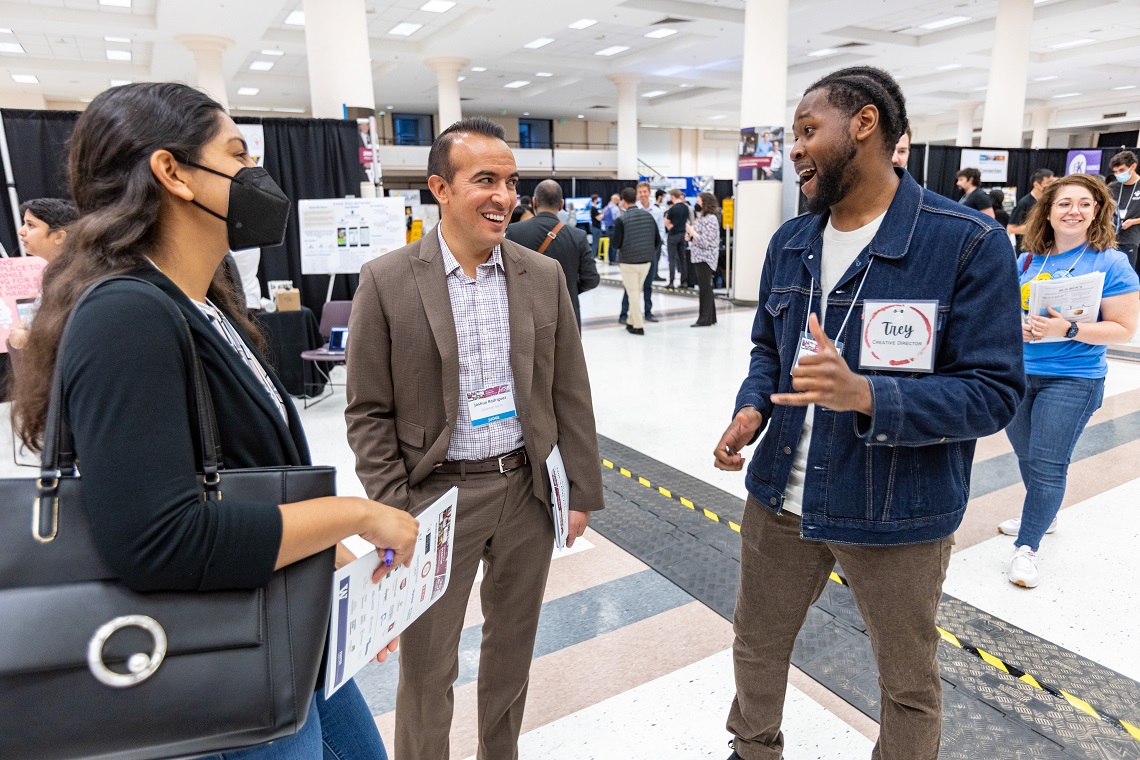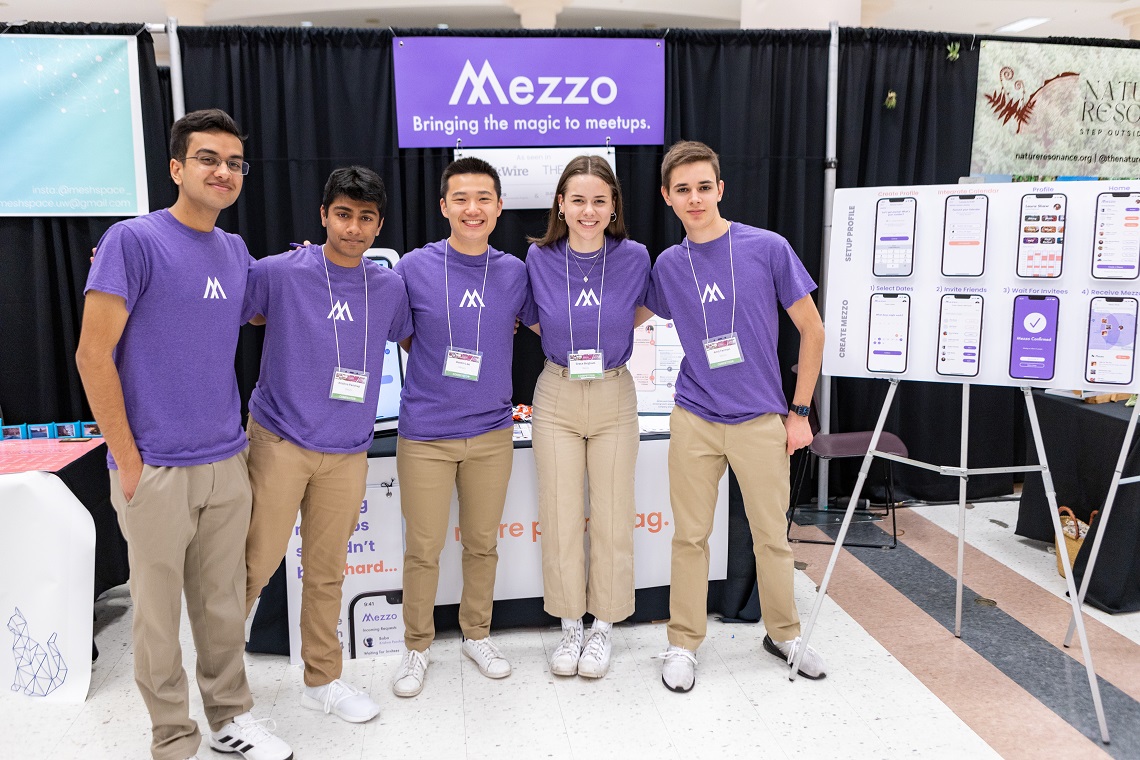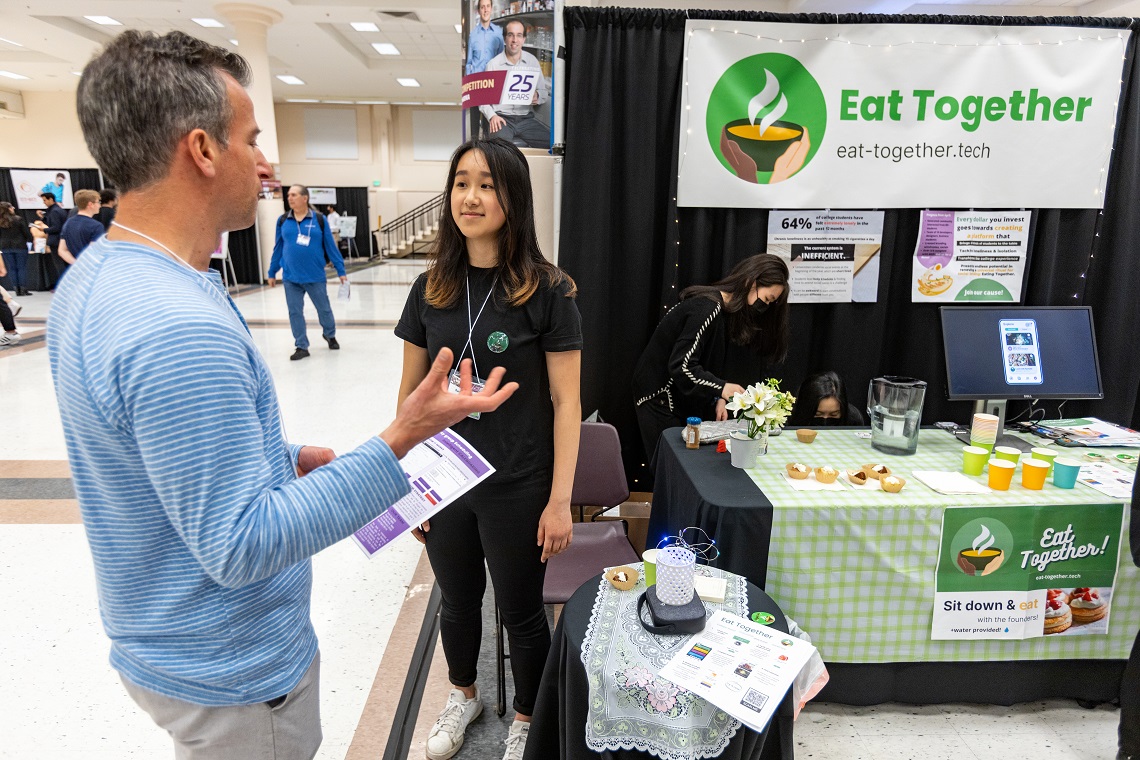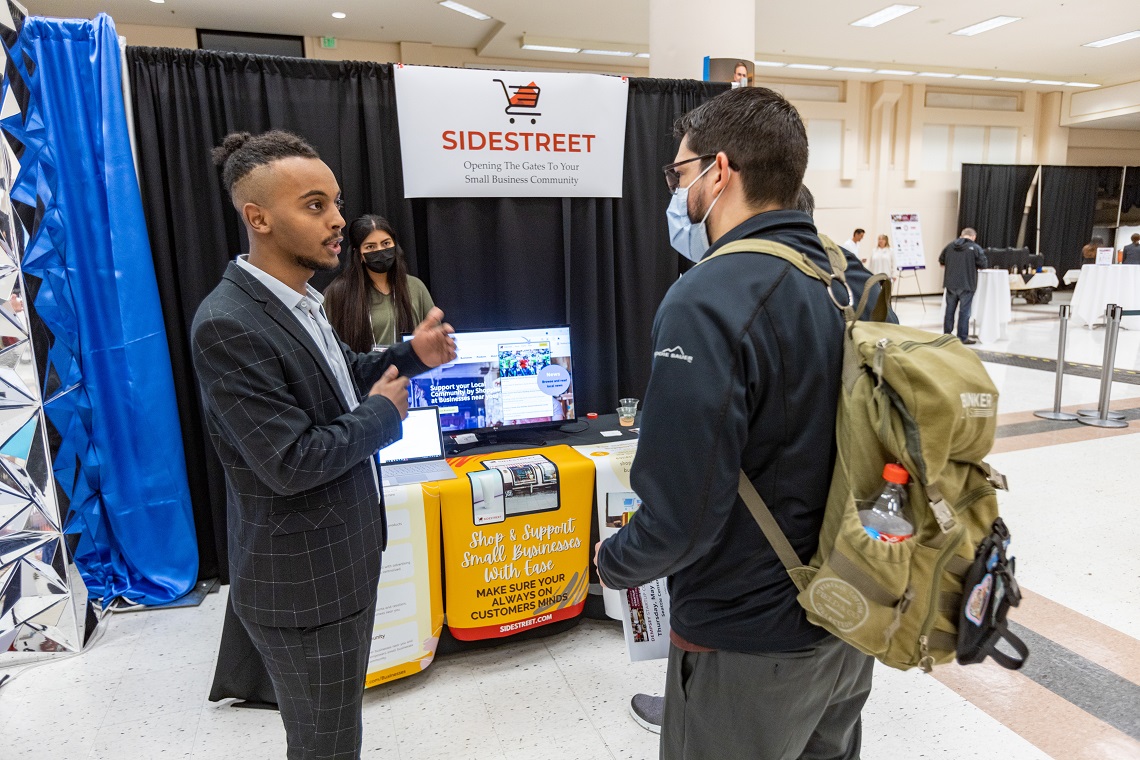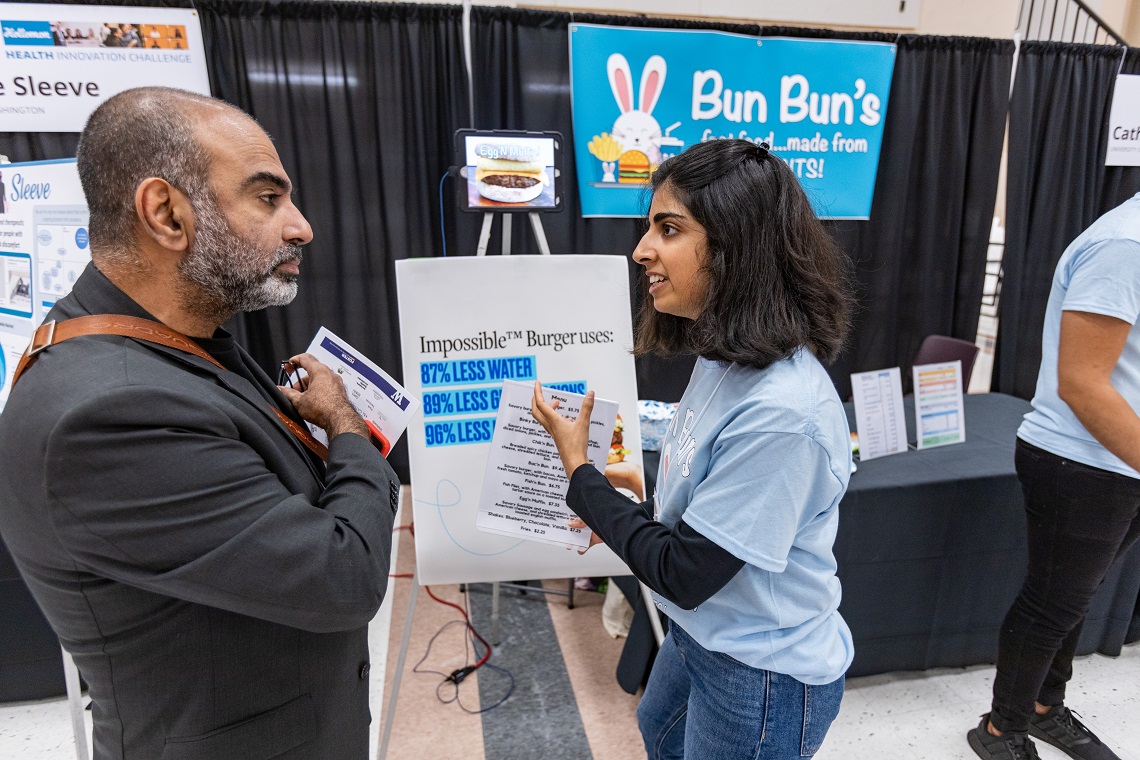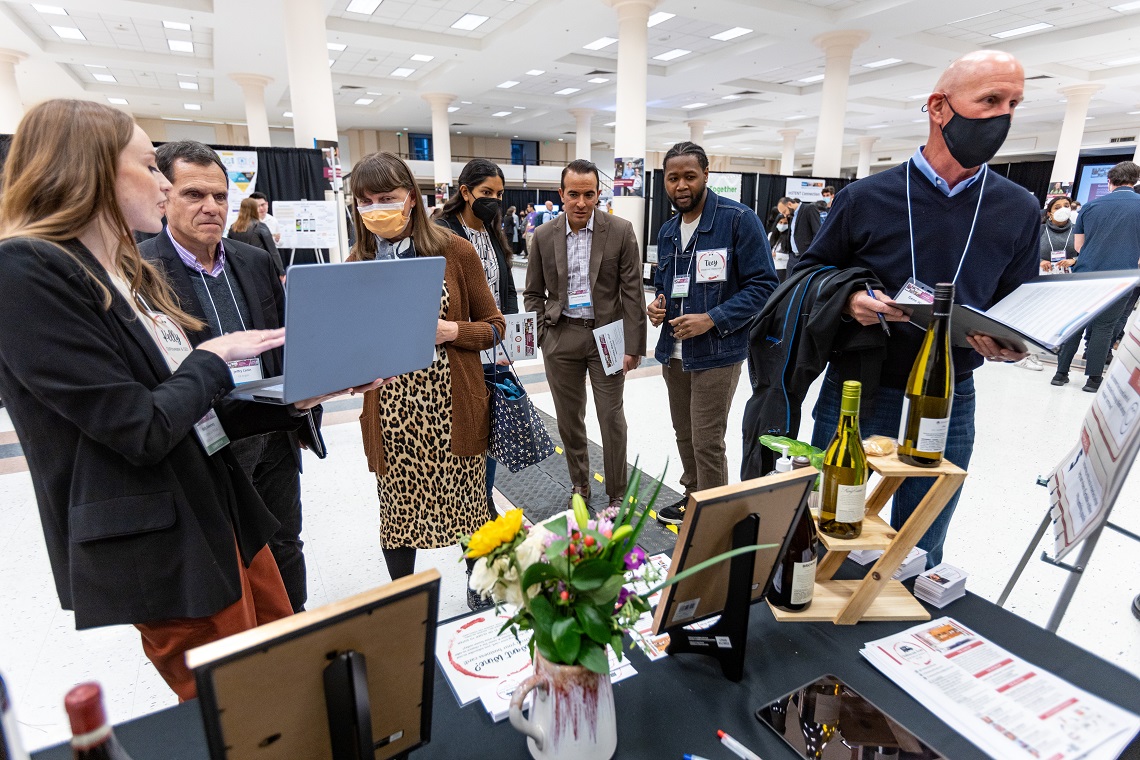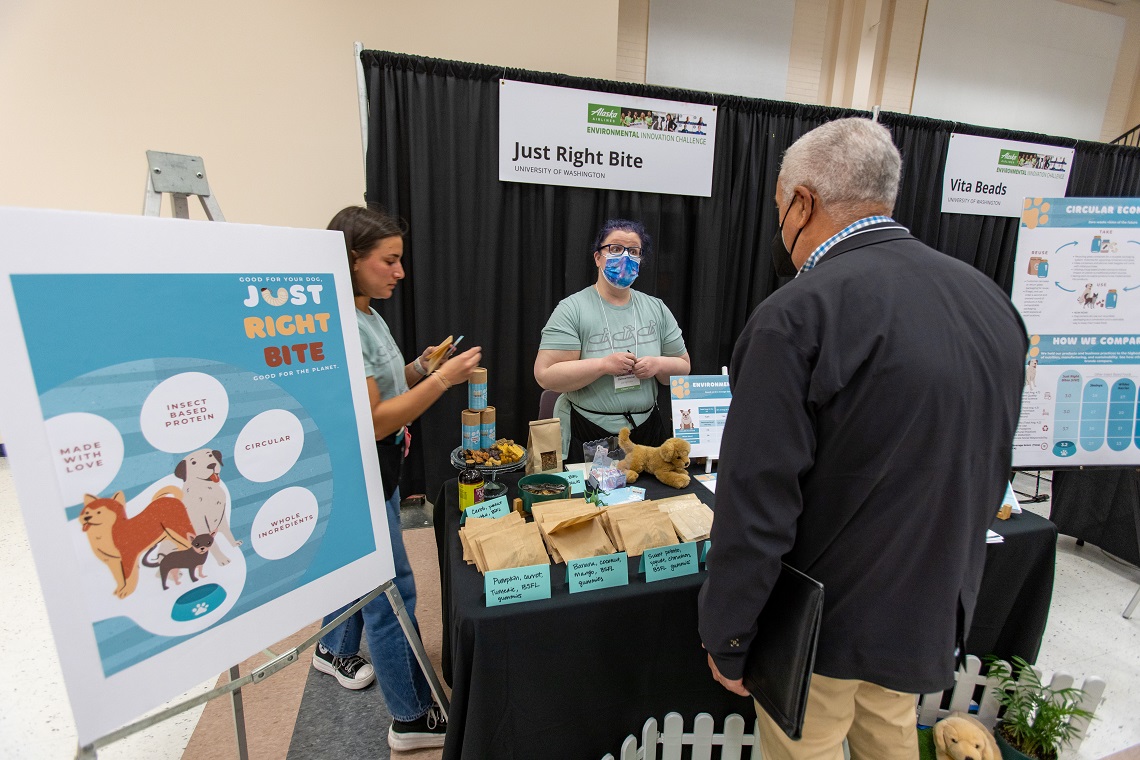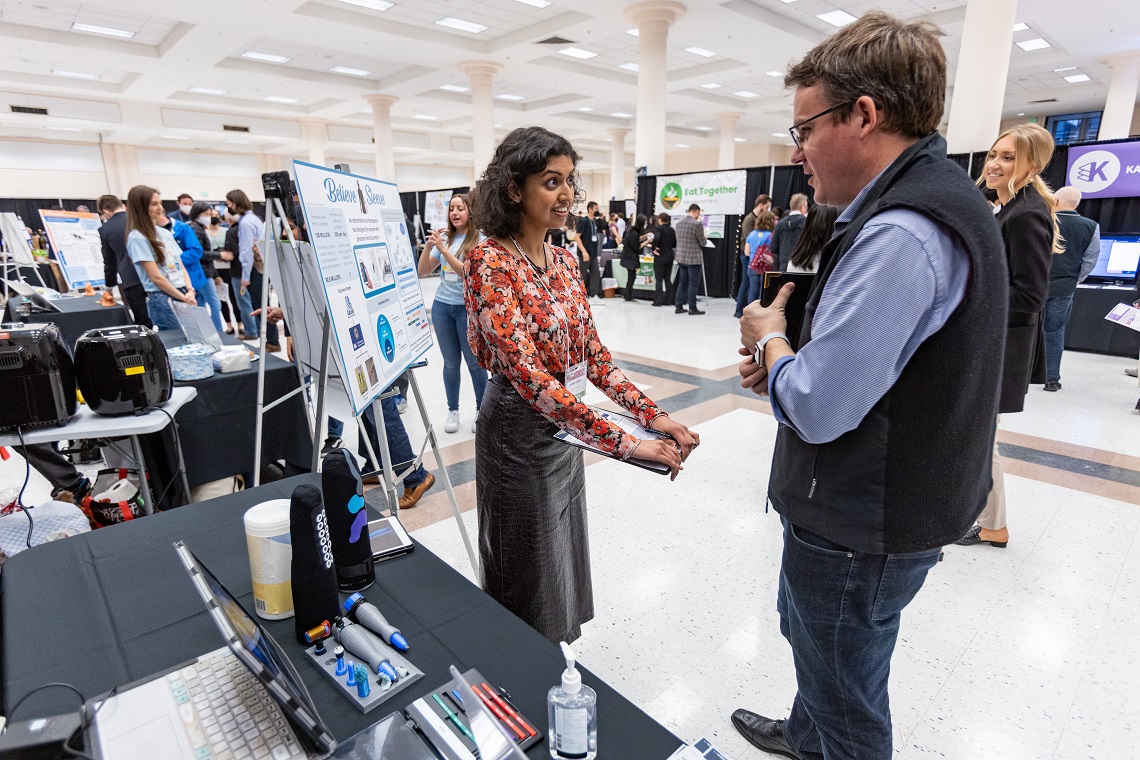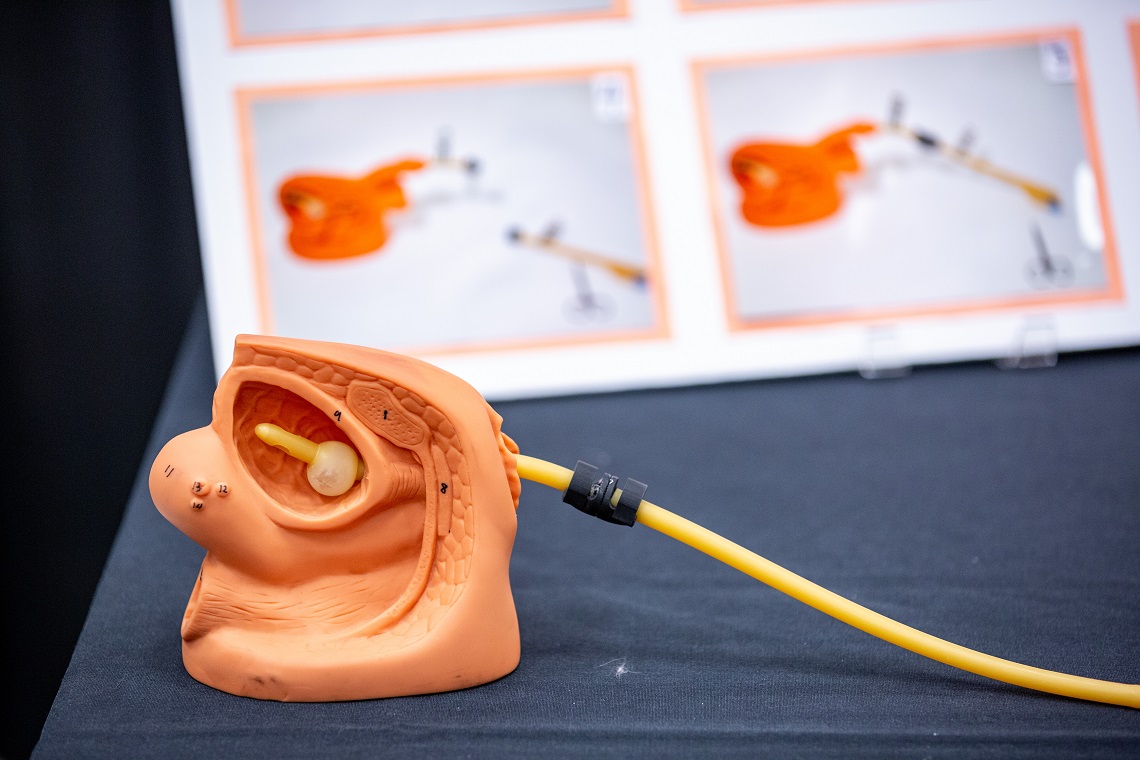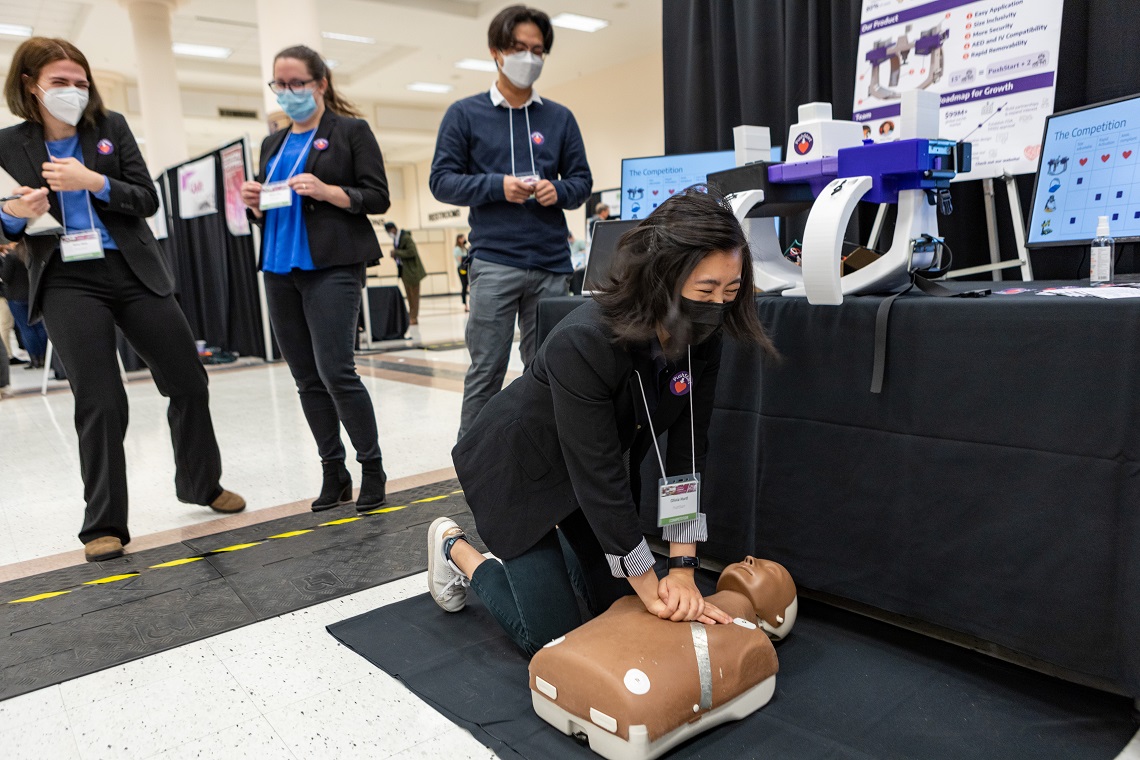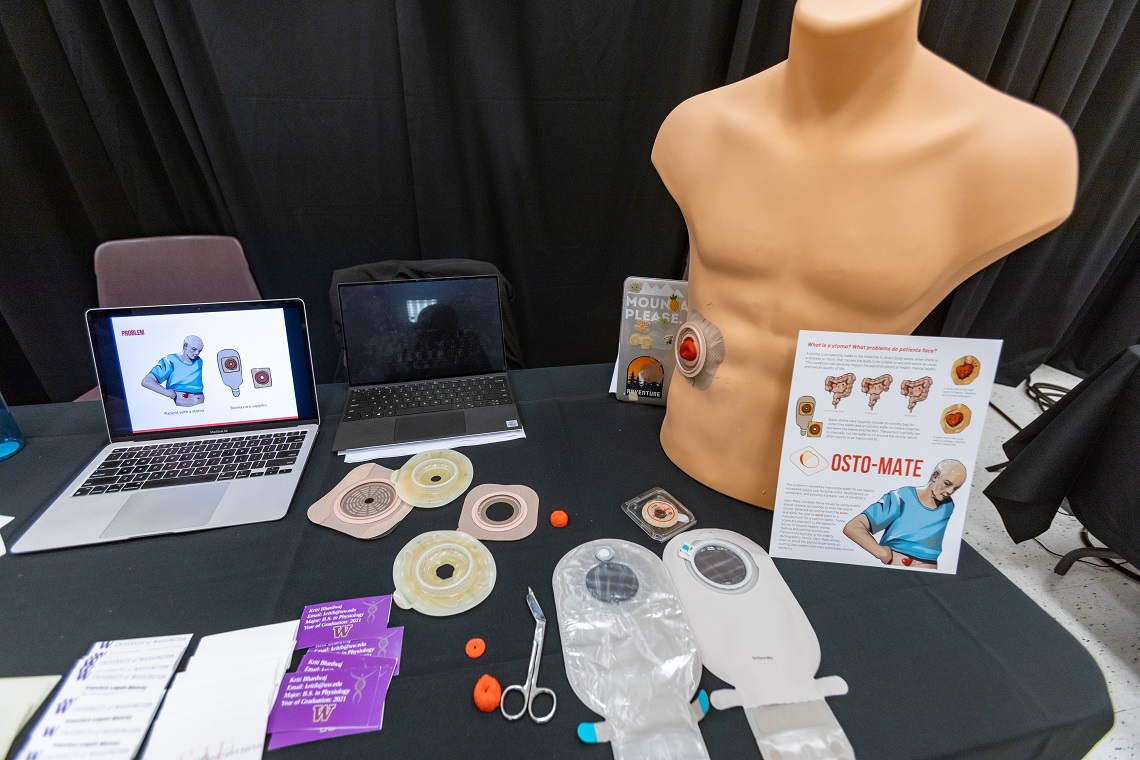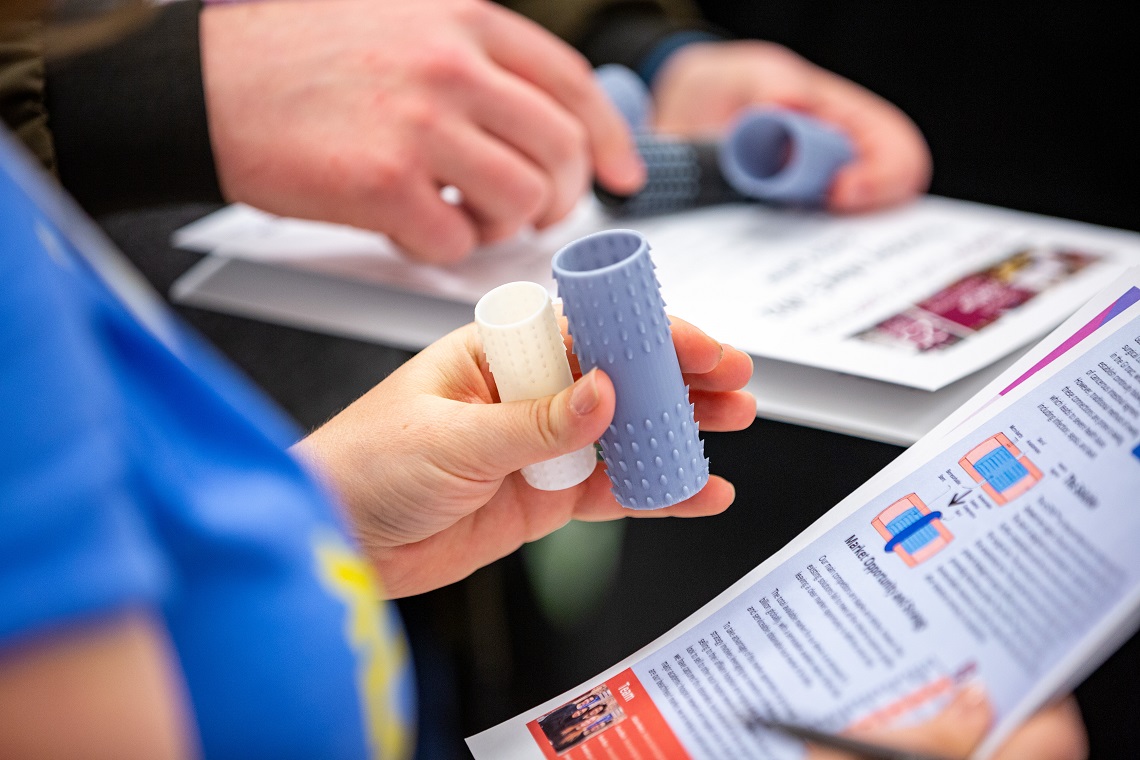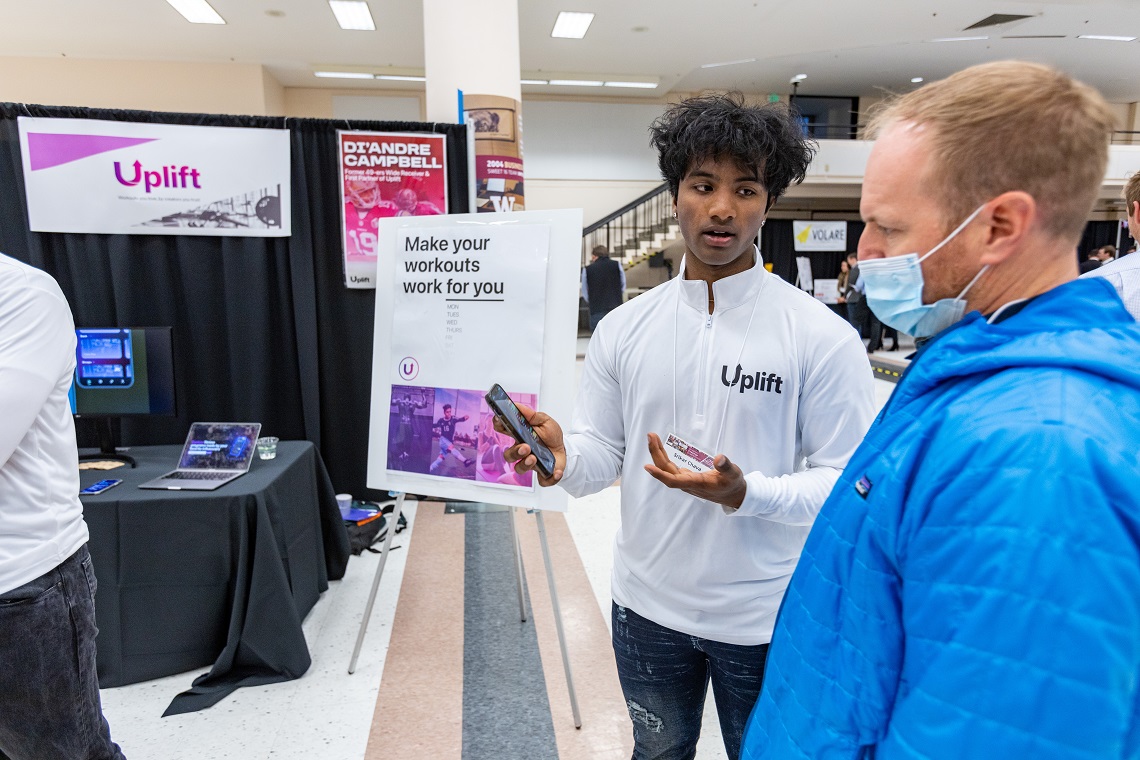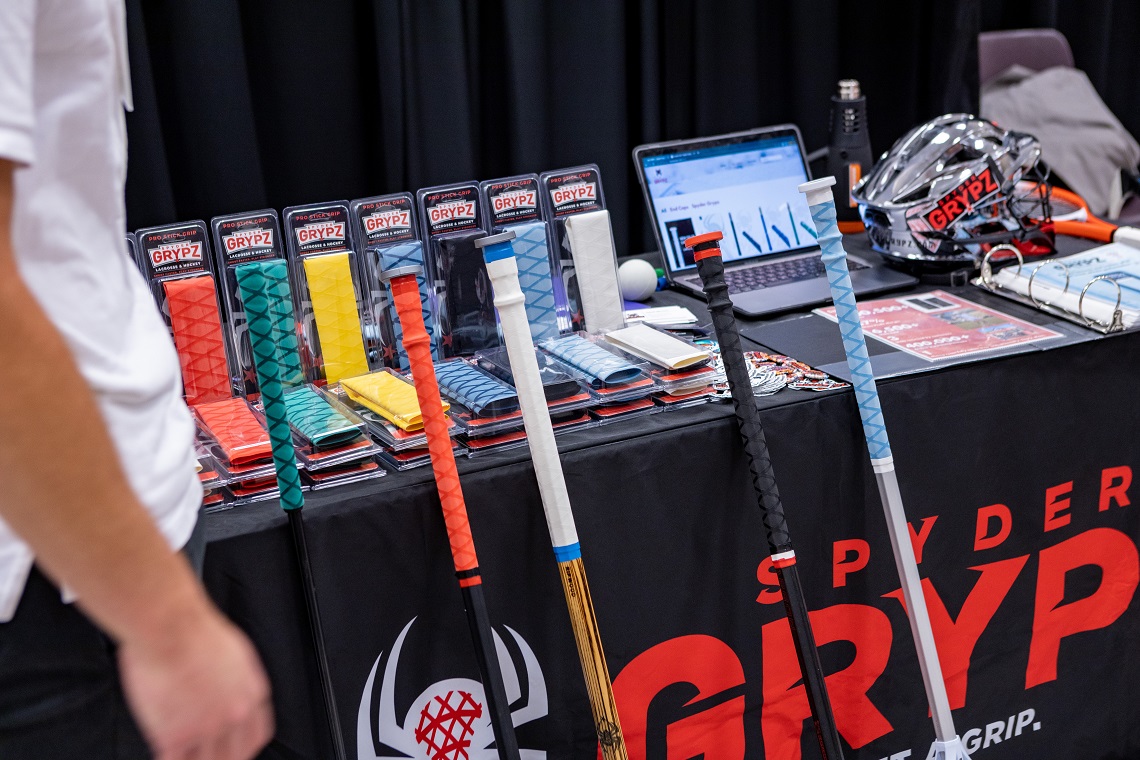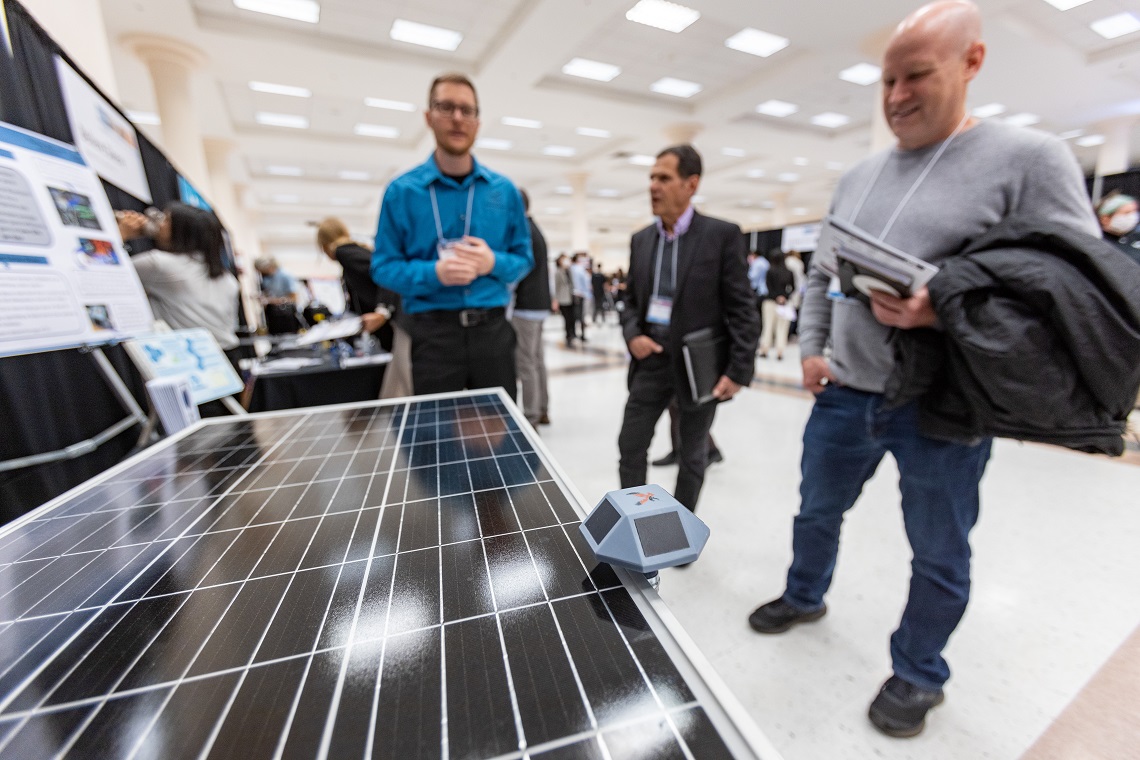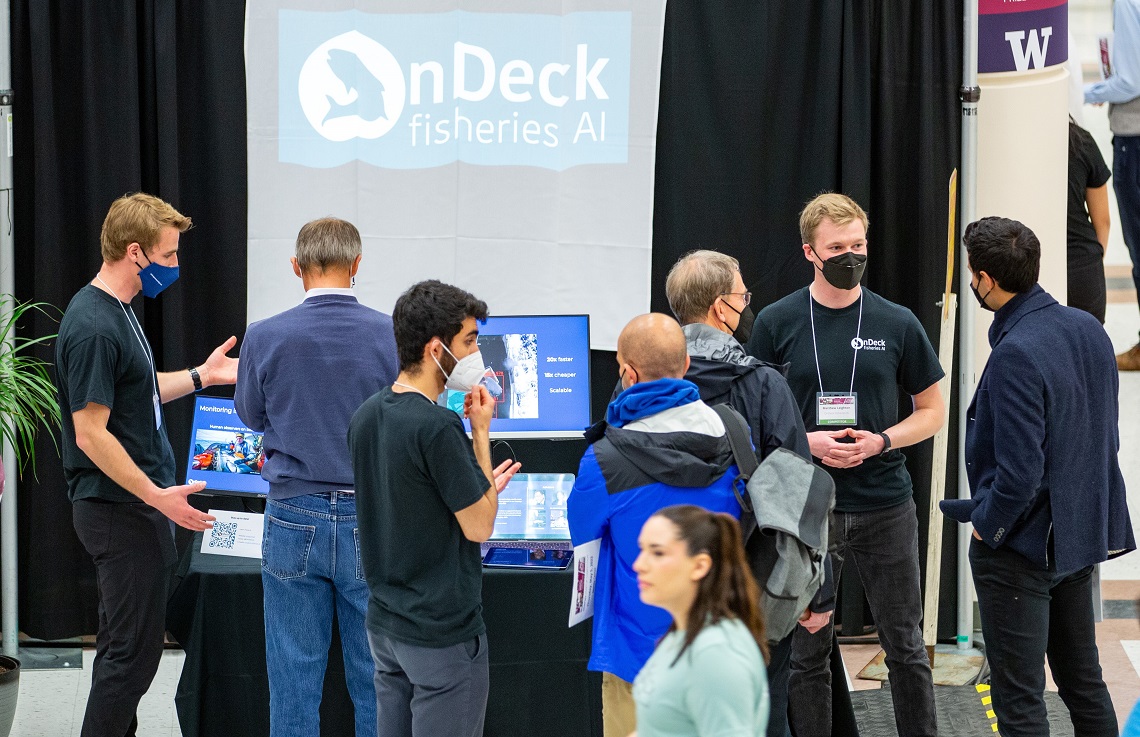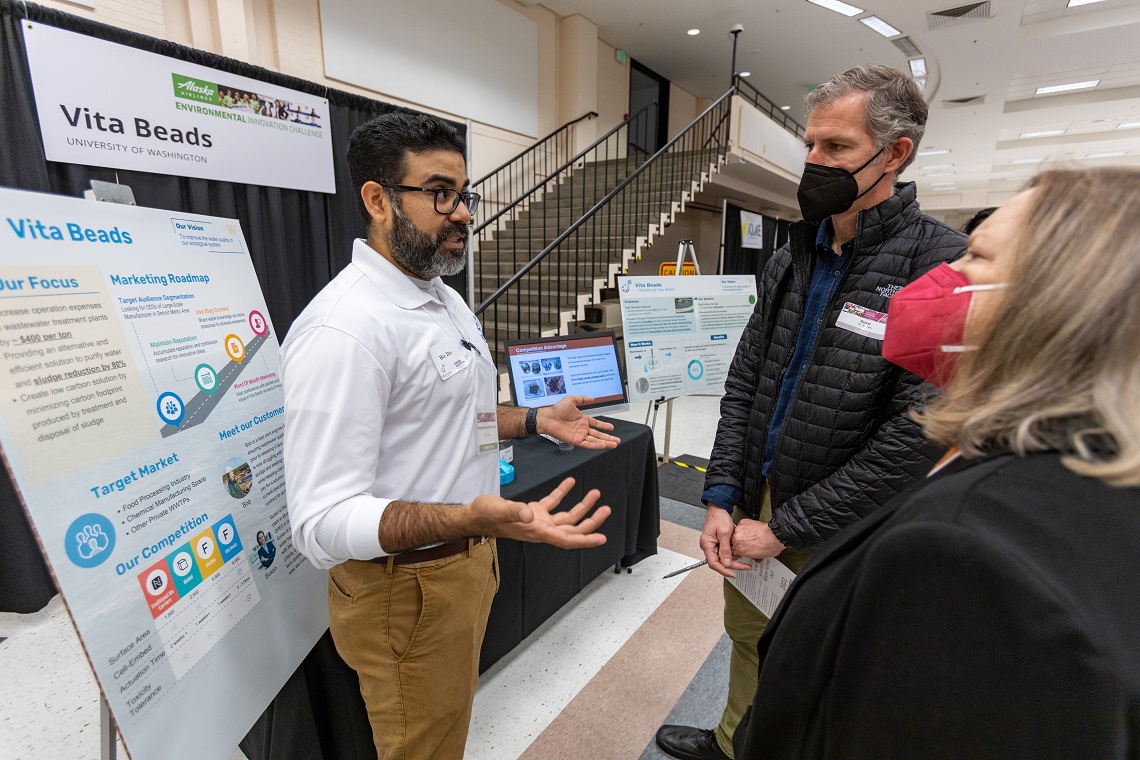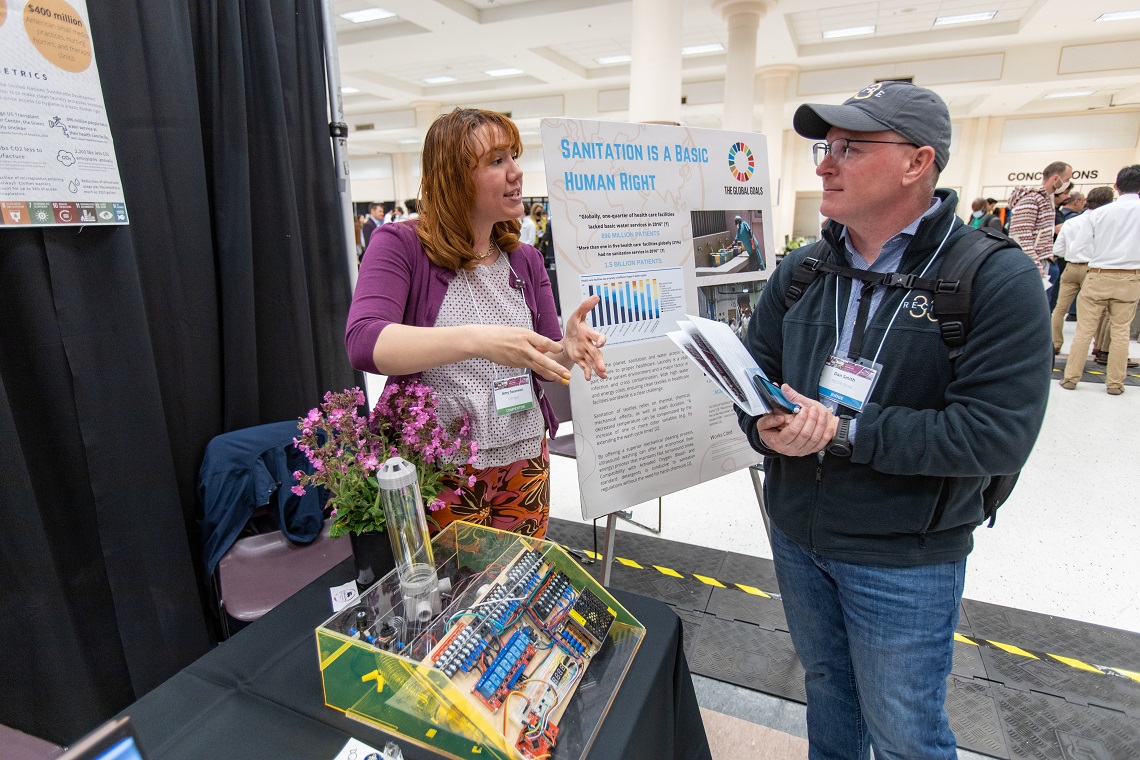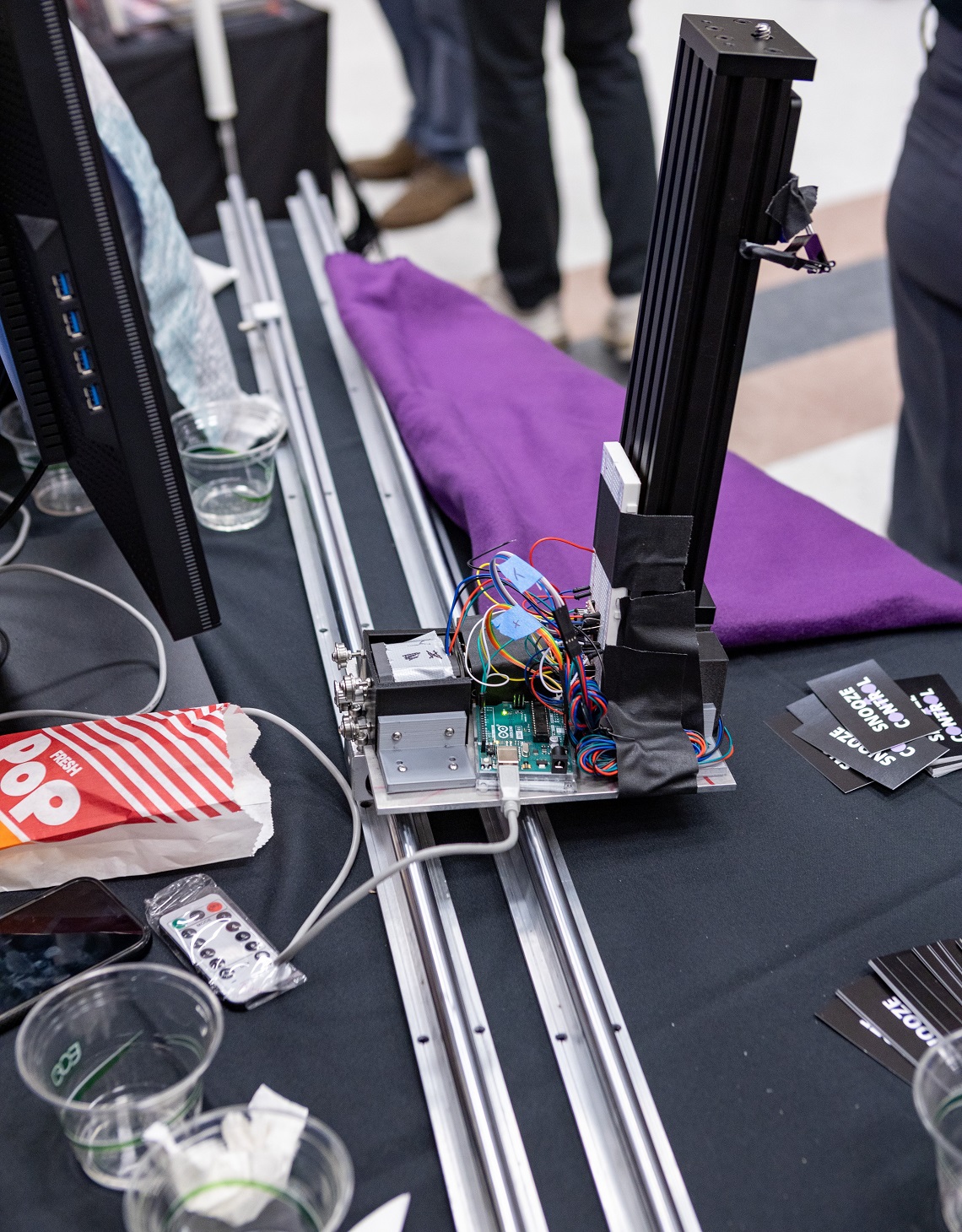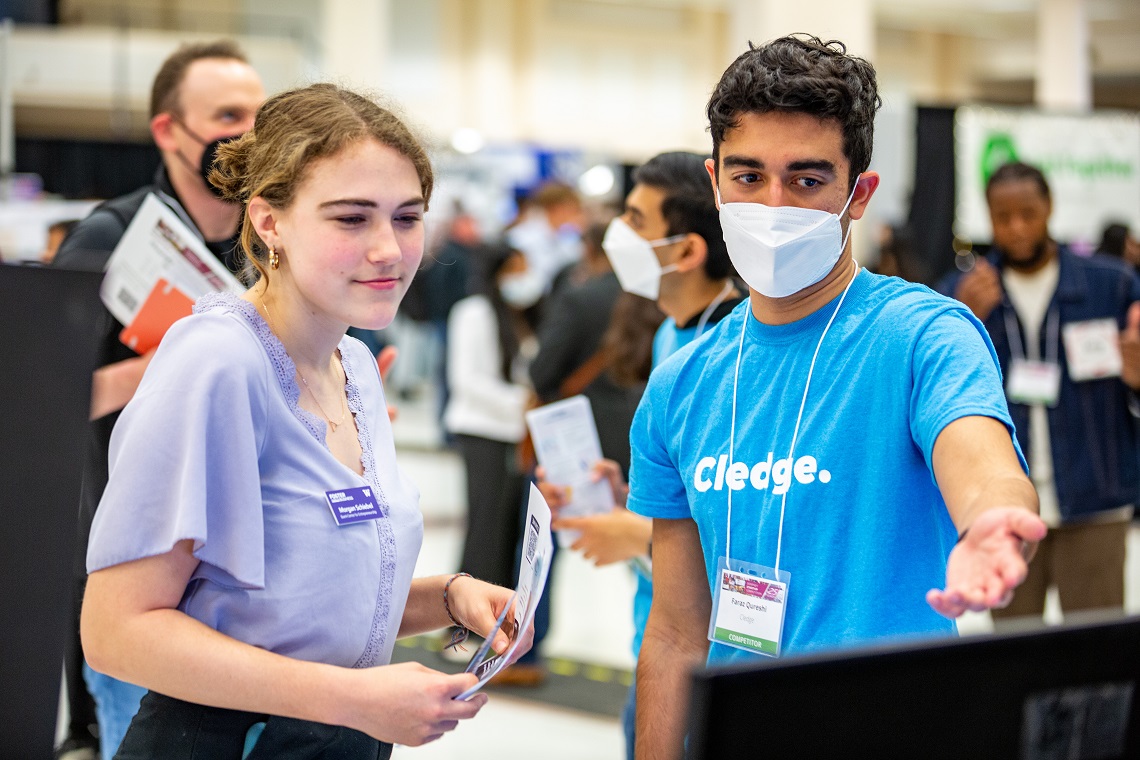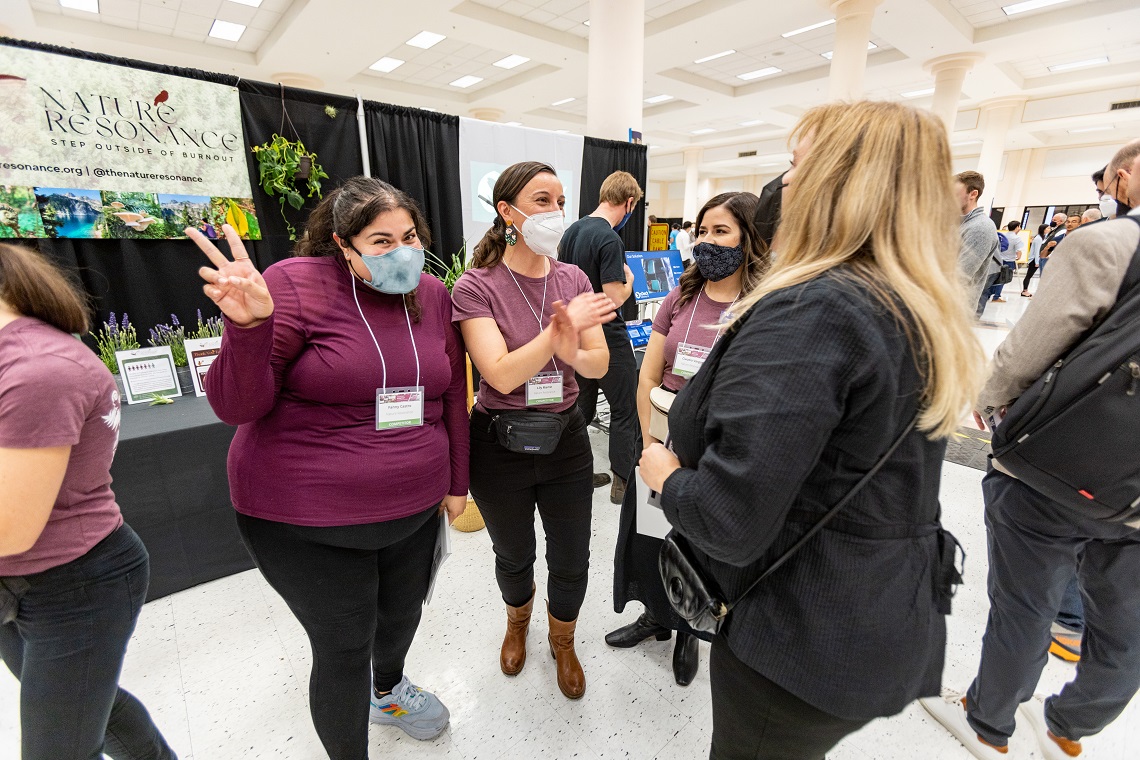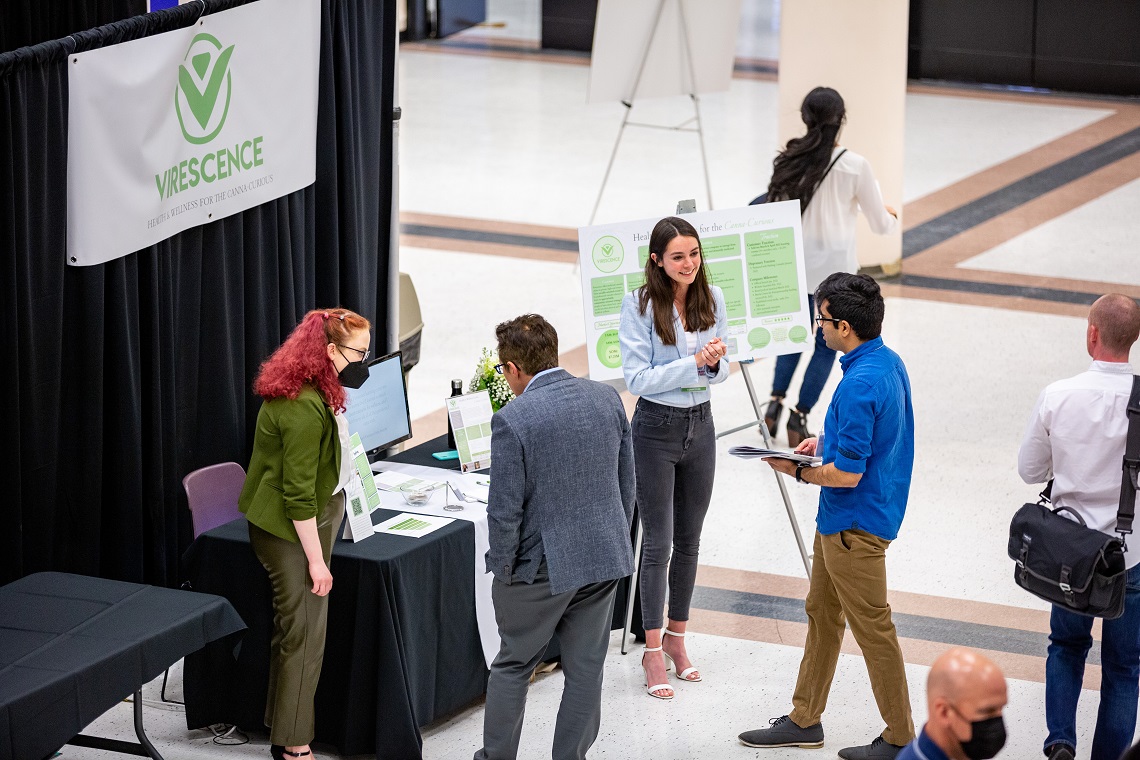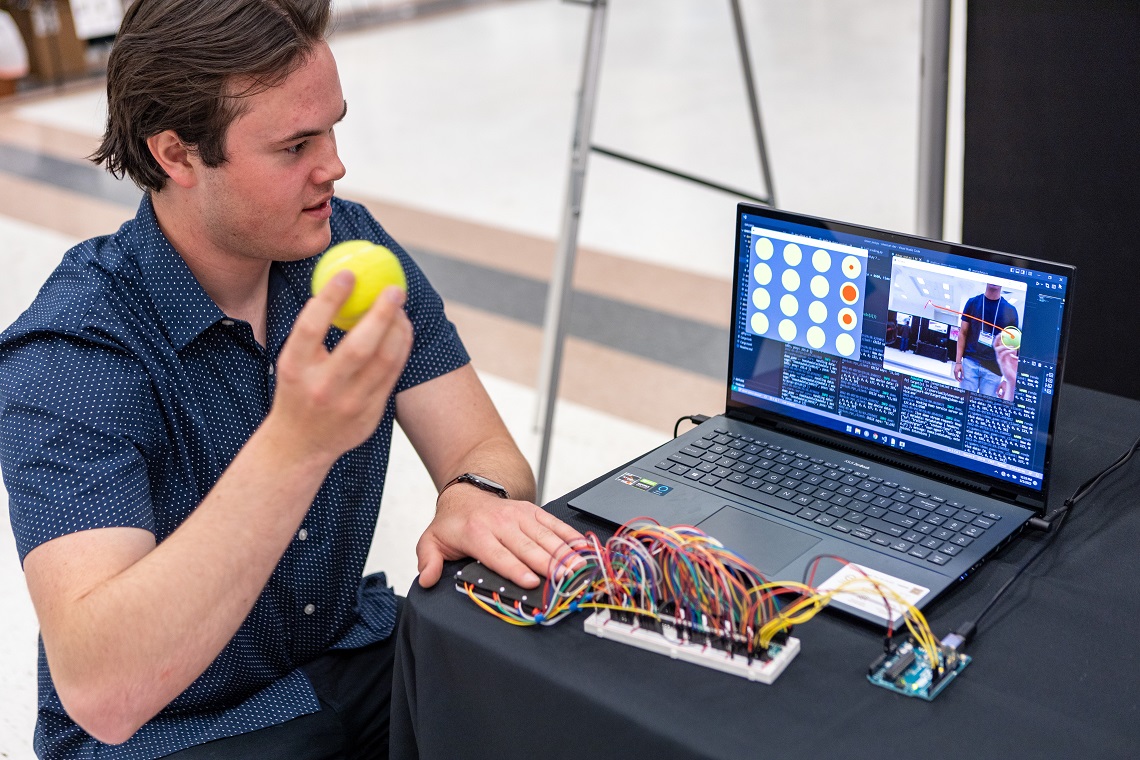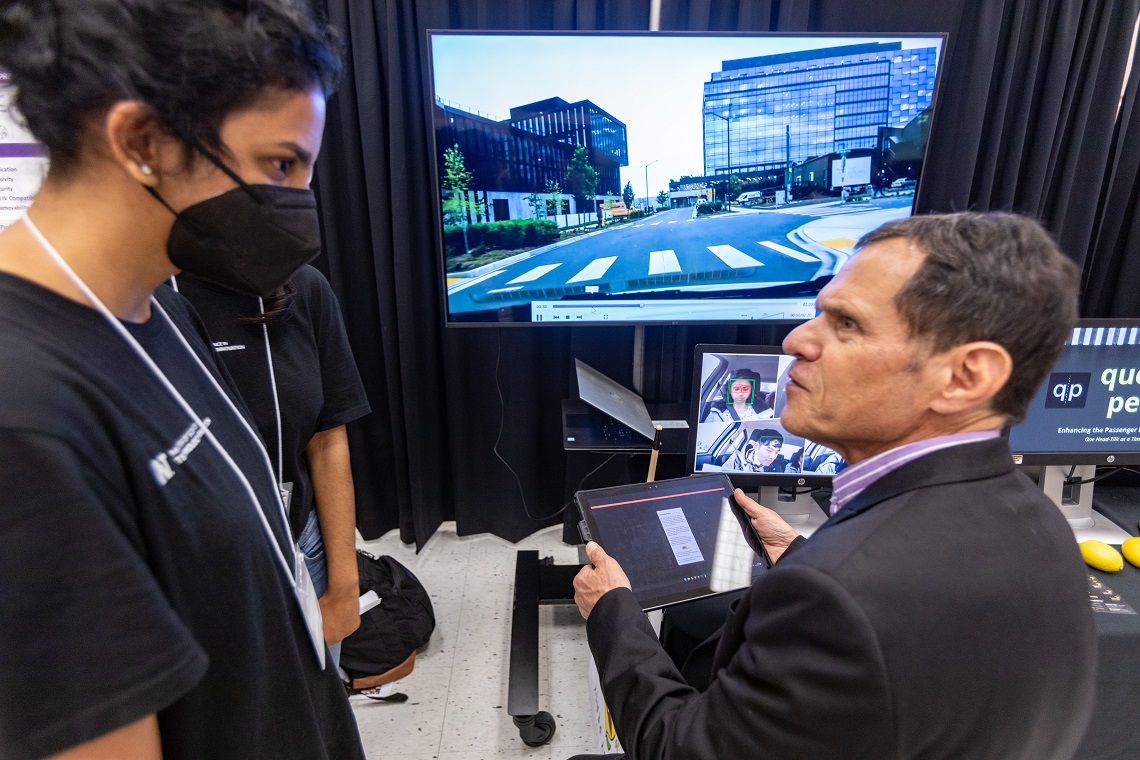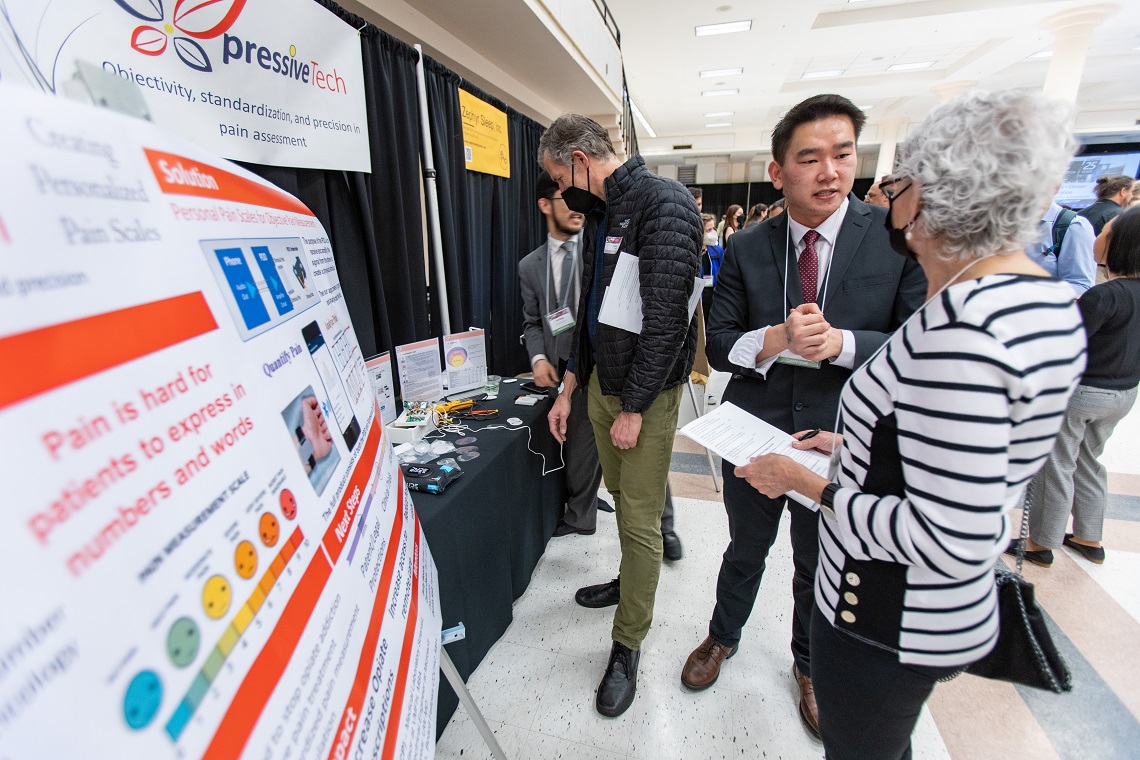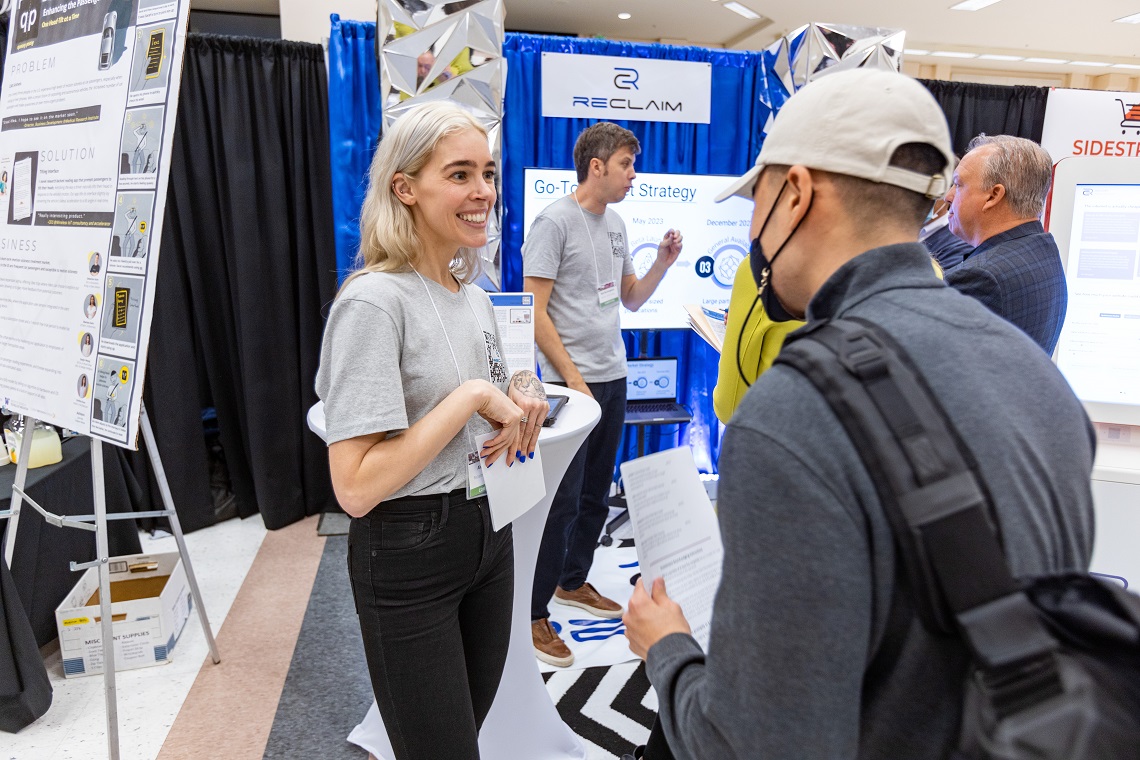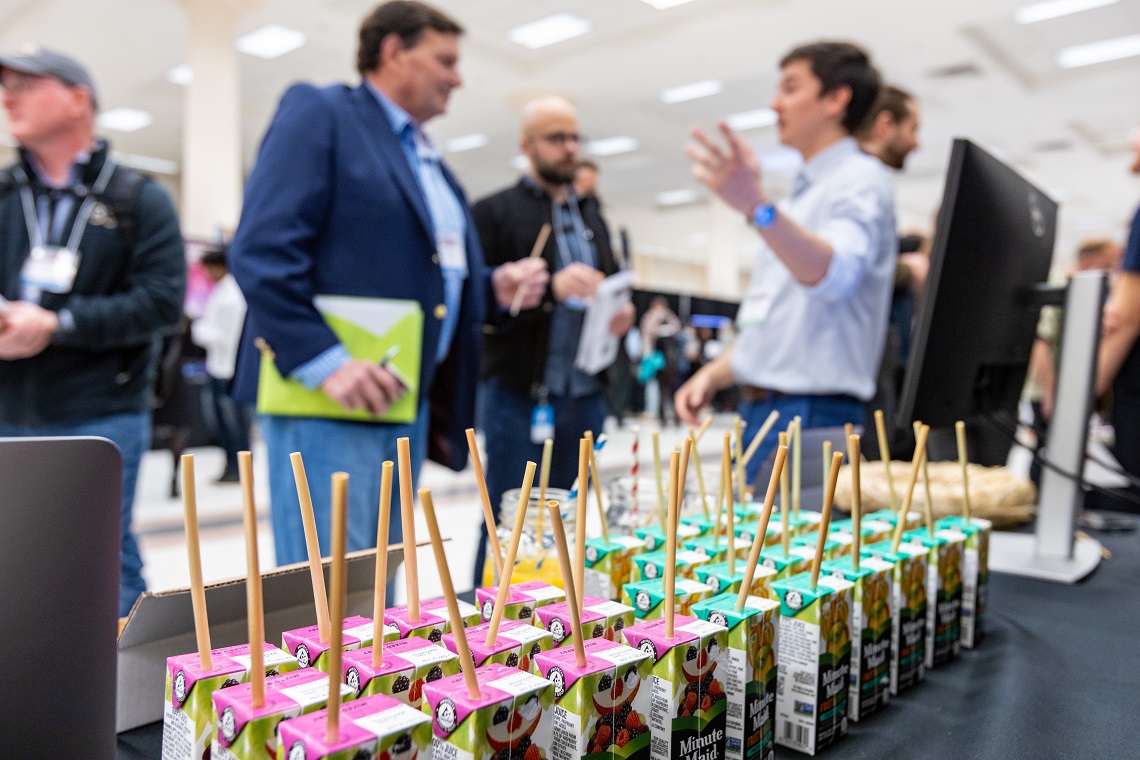Pitchella!
At the 25th annual Dempsey Startup Competition, the art of persuasion returns to the exhibition hall
The vast Seattle Center Exhibition Hall is a site for eyes sore from too many months staring at too many faces sequestered into too many tiny digital boxes.
A proper throng of student entrepreneurs works the circuit-riding crowd of judge/investors recruited from the region’s entrepreneurial community by the hundred. The nascent company displays project a pageant of persuasion. The collective voices swell into a motley chorus of cajoling and convincing. The vibe is downright celebratory.
It’s the investment round of the Dempsey Startup Competition, hosted for the 25th year by the Buerk Center for Entrepreneurship at the University of Washington Foster School of Business—but the first time in-person since 2019.
Two years online offered some advantages: multimedia, scripted product demos, the focused hush of a Zoom breakout room.
But nothing beats the buzz of a hall full of young entrepreneurs at fever pitch. Here is a sampling of the presentations, promotions, props and prototypes experienced—live and in-person!—at this year’s Dempsey Startup Competition.
Community hubs
After two years of pandemic pulling us apart, it’s no surprise that there were a number of companies built on innovations that help people connect in the physical world.
The team behind the smartly branded Mezzo—an end-to-end planning service that synthesizes customer schedules and preferences to recommend convenient meetups—stirs up business with a roaming human placard and eye-catching purple t-shirts.
Kadence is developing a more intelligent workplace platform for scheduling group meetings. Eat Together connects college students around meal affinity. And GroupHang is a platform where friends can co-plan activities together.
Disha Stay Network, inspired by the cancer trials of a founder’s sister, is an online booking platform for families to find convenient and affordable lodging during away-from-home medical treatment.
And SideStreet is an online hub for consumers who prefer to patronize small businesses via a “shop local” extension on Amazon and other big e-commerce sites.
Edifying edibles (and potent potables)
The lingering effects of COVID-19 might explain the relatively few sampleable food or beverage plays at this year’s edition.
There is, however, the intriguingly named Bun Bun’s, which plans to be Washington state’s first 100% plant-based drive-thru burger joint.
And, behind a display of Brobdingnagian wine bottles lies Château sur Roues (“Winery on Wheels,” en Francais), a charming Airstream-based mobile wine-bar available for all manner of events and parties. But it’s initial plan targets Millennials—a gaping demographic hole in the wine market—where they already gather.
Kelly Sweeney, a student in Foster’s MS in Entrepreneurship Program and the architect of Château, explains that young adults would rather spend money on experiences than on products. “Having a wine-tasting experience is already exciting for them. We’re hoping to track FOMO,” she says, conveniently spelling out the acronym for the unaware. “That’s fear of missing out. So, when these Millennials come and taste, it’s so cool that they can’t help but share on social media.”
Dogs can relate to fear of missing out… on a tasty treat. But could that treat be more nutritious? And more environmentally responsible? The folks behind Just Right Bite think so.
Their treats come in a variety of fun flavor combinations. Sweet potato, yogurt and cinnamon gummies. Carob and peanut butter brownies. Pumpkin biscuits. All include a secret ingredient: bugs. Specifically, ground up crickets, mealworms or black soldier fly larvae for added protein that is eco-friendly and easy on the tummy.
“No other pet food brand is aiming to be circular, to be its own source of the ingredients that go into it,” says Chelsea Fletcher, another MS in Entrepreneurship student who heads product at Just Right Bite. “That’s our goal.”
Medical marvels
Multiple medical innovations have been hatched by students engaged in the UW Engineering Innovation in Health (EIH) program.
Believe Sleeve is a miraculous therapeutic system that helps amputees alleviate phantom limb discomfort—a sensation that afflicts tens of millions worldwide.
CathConnect, its sensitive technology demonstrated rather explicitly on an anatomic cutout of the human urinary tract, is a device that improves the safety of catheters by allowing the tube to easily disconnect when pulled.
A life-size model of a human torso lying flat on the floor announces PushStart, an innovative CPR device that can safely and consistently perform life-saving compressions on people suffering from cardiac arrest outside of a hospital.
Another torso, this one upright and baring an alarmingly exposed outlet to vital organs, illustrates the dilemma addressed by Osto-Mate. It custom-cuts sterilized “wafers” that act as a valve connecting the digestive or urinary tract to an ostomy bag for safe removal of bodily waste—and a safer alternative to the convention of patients cutting their own wafers to fit with scissors.
Staying in the gastrointestinal region, inSTENT Connection is developing the first naturally absorbing stent for patients undergoing GI tract surgeries. This vastly improves upon the standard practice of rejoining sections of intestine with sutures or staples. “Even saying it sounds archaic,” says co-founder Evan Ross, a UW undergrad studying chemical engineering. “How have they not come up with a better solution? So, that’s what we’re trying to do.”
His team’s non-degradable stent employs barbs at either end to connect lengths of intestine with a superior grip and less risk of serious complications on surgeries in this sensitive region of the body.
The sporting life
In the wide world of sports…
The burley fellows behind Uplift, decked out in branded athletic gear, tout their influencer-based personal workout app.
More sporty dudes are selling Spyder Grypz, an innovative line of handle wraps for lacrosse and hockey sticks, golf clubs and tennis rackets designed to enhance the performance of athletes who wield them.
Environmentally sound
On the heels of the Alaska Airlines Environmental Innovation Challenge, it’s little surprise that several promising Dempsey Startup entries are selling sustainability.
Take Aquila Outdoor, an off-grid renewable energy network targeting the RV market, whose presence is symbolized by the curiosity of a solar panel installed in a place where the sun don’t shine (that is, the bowels of this windowless hall).
OnDeck Fisheries AI provides automated catch monitoring that addresses the issue of declining global fish stocks.
VitaBeads, which the founders call “vitamins for your water,” clean up rivers and lakes with absorbing pearls that remove pollution the way those DampRid crystals absorb moisture from Seattle closets.
And then there is Ultropia, purveyor of the Ultramatic all-in-one washer/dryer. Johnnie, tell them what it does!
This charmingly named multi-tasker, the size of a mini-fridge, uses a high-frequency ultrasonic emitter to clean, sanitize and dry clothing more quickly, efficiently and gently than anything on the market—saving time, water and electricity for people in the developing world (though it would be welcome in my house, too).
Sleep train
Like the twinned movie releases Deep Impact and Armageddon, Volcano and Dante’s Peak, Antz and A Bug’s Life, The Prestige and The Illusionist, this year’s Dempsey Startup entertains two different approaches to sleep discomfort experienced by people with mobility impairments.
As a result? “Sixty million Americans are prisoners in their own beds,” says says a UW mechanical engineering student.
To address this problem, Zephyr Sleep has designed a programmable mattress that allows people suffering injuries, arthritis, ALS or Parkinson’s to adjust their comfort without assistance from caregivers.
And Snooze Control provides greater independence through a voice-activated blanket control system designed to operate on popular virtual assistant platforms.
Alexa, pull up the blanket.
Education, primarily
Among companies in some aspect of the education space…
The sky blue-shirted team behind Cledge touts the “world’s first fully automated AI counseling service” for college-bound high schoolers.
Nature Resonance, goes with more verdant tones and a calming display of vegetation to express the essence of its restorative nature retreats to help high-stress workers—initially, teachers—counteract burnout.
Virescence—named after the botanical term describing the state of becoming green—offers a different kind of restoration and relaxation. Its professional marijuana education experiences for “canna-curious” women target caregivers, a demographic less likely to be aware of its well-documented health benefits.
“There’s a massive gap in the market right now due to lack of access to the research,” says co-founder Jax Morgan, a UW undergrad studying informatics and entrepreneurship, who launched the company in Foster’s venerable Creating a Company course.
Sensations
A company called OneCourt has created a tactile display that allows people with visual impairments to “watch” televised sports with their fingertips. Extracting positional data from the video, the ball in play leaves a trail of micro-vibrations as it pings around the screen (representing the field, court or rink). A visually impaired person can follow the ball to enhance the audio call of the action.
And queasy peasy is a dynamic tilting app that tricks the mind into thinking that the games, videos and words running across mobile devices are moving relative to the motion of the vehicle its owner is traveling in. It’s developed by UW students in design, data science, economics, architecture and electronics, all of whom have one thing in common: “We all have motion sickness,” laments co-founder Soojin Hwang.
A line has formed to test the prototype of Xpressive Technology: the “next generation in pain management” that provides an objective measure of pain sensitivity. Nodes attached to the forearm deliver painless vibrations at increasing intensity. The point at which you feel the vibration sets a personal baseline of pain sensitivity—incredibly useful data to provide healthcare providers and inform treatment.
“You can’t really tell a person’s pain sensitivity,” says Jamie Kim, a Foster MBA on the Xpressive team. “Everybody’s different. The biggest person can be the softest, most sensitive person. And that’s something that’s very hard to convey to a doctor.”
The sublime and the simple
There had to be a blockchain company, of course.
But Reclaim is not the most obvious of blockchain deployments. Instead, it uses the complex distributed database technology to enable customers to view websites without advertisements for a nominal fee—around $.02 per page—while passing on most of this fee directly to the viewed sites as a replacement for ad revenue.
From a service whose methodology is nearly incomprehensible, we close the Dempsey Startup circuit on the essence of simplicity.
Origin Straws offers a sustainable alternative to plastic straws by simply cutting, drying and sterilizing the base stem of ordinary wheat stalks left over after the grains are harvested the world over.
“Would you like to try it out in a juice box?” offers co-founder Emily Chow, who studies supply chain and information systems at Foster.
Upon trial, the “staff of life” turns out to make an ideal delivery vessel for cold beverages, with a consistent circumference, a smooth and sturdy tubular structure, and a natural waterproof coating to keep it from decomposing in liquid the way that paper straws do. Best of all, this reclaimed agricultural castoff is completely biodegradable once it has served its second noble purpose.
Is there any drawback to an Origin Straw?
Chow considers the question for a moment before admitting: “It’s probably too thin for bubble tea.”
Photography by Matt Hagen.
Check out the Sweet 16 teams that have advanced to the final rounds of this year’s Dempsey Startup Competition, culminating May 26 at the Foster School of Business.

